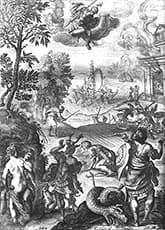Metamorphoses
Critique • Quotes • Translations
 Illustration, 1640 edition
Illustration, 1640 editionFirst publication
8 AD
Literature form
Poem
Genres
Epic poetry, tragedy, pastoral
Writing language
Latin
Author's country
Rome
Length
15 sections ("books"), approx. 12,000 lines
A transforming experience
My first reaction to Ovid's Metamorphoses was mystification. This was one of the great books of Western culture. Ovid was said to be wickedly delightful to read compared to other ancients. And I was reading an acclaimed translation into modern English.
So why did I find it deadly dry, repetitive and boring?
Again and again I'd have to look up the mythological figures in footnotes or other sources to figure out what was going on. Over and over, whenever some interest would be created by one of these characters, he or she would turn into a tree or fish or bird or star...and then on to the next one. The overarching story was impossible to follow, as it kept jumping around to fit in as many of these subplots of metamorphoses (changes of body) as possible.
Then, halfway through, I checked out some other translations. And I found one that suddenly made Ovid's stories jump off the page.
I no longer needed to check every reference as this translation made the identities of the people and places apparent. I read the second half of Metamorphoses much more quickly. I could see why the ancients might have thought this was hot stuff and why so many other great writers, old and modern, have been influenced by Ovid's writing.
Sharing the telling
The version I enjoyed, by David R. Slavitt, was called a "free translation", which is to say it was not a strict rendering of what Ovid wrote but an imaginative reworking of it, something that is often frowned upon by serious scholars. Checking it against other translations and what others have said about Metamorphoses in Latin, I had to conclude that some of what had been added in this free translation may not have been exactly what the original poet had in mind.
But whether it was in the spirit of Ovid is another matter. In any case, it revived my interest in the work and led me into other editions. And that's a good thing, right? (More about this in the commentary on Metamorphoses translations.)
The ancients had a body of mythology, built on Greek legends starting before Homer and extended by the Romans, legends everyone knew and in which the artists could share in the telling of. I can't think of a similar set of stories common to our age that every author similarly dips into; the closest we can come to it may be folk tales, or the Bible and other influential religious mythologies.
But even in that environment, Ovid was a maverick. When he told each of the beloved tales, it was with a twist—several twists actually. Like many writers he changed the details of the stories he plagiarized for his own dramatic purposes, putting characters together who hadn't met in previous legends and contriving new outcomes for them. (Something like "Frankenstein meets the Wolfman" in our time).
Also, he often parodied the grand epic styles of the serious writers who had told the stories before him. He added sly innuendos, ridiculing the pompous and righteous, all the while maintaining an innocent demeanor.
The big picture
Most importantly in Metamorphoses, he fited everything that had ever happened in the world into his own grand scheme. The only constant, he proclaimed, was change—ever since the world was created, right up to the founding of Rome.
In the last of the fifteen books of Metamorphoses, he makes this Pythagorean claim explicitly, along with appeals for reincarnation and vegetarianism. But throughout the work, this is implied in all the bizarre stories of people turning into lower forms (stone, water) or higher forms (stars, gods).
In the end, he does some obvious kowtowing to the emperor Augustus, extolling his adoptive father Julius Caesar and predicting their empire would last a long, long time. You have to wonder how successful this appeal to the status quo could have been though, given that the bulk of the work argues that change is inherent in everything.
I still find the overall work too choppy. Ovid uses any excuse to string his scores of metamorphosing examples together. You can easily get lost in the stories within stories and then suddenly get jerked to another part of the ancient world with all new characters and a new set of stories within stories.
Perhaps you're not meant to read through all the tales in one go. Perhaps, as with a collection of fairy tales or a biblical text, you're supposed to read a story and put it aside for a while, then pick up another episode a day or two later. Next time I'll try it that way.
— Eric
Critique • Quotes • Translations

